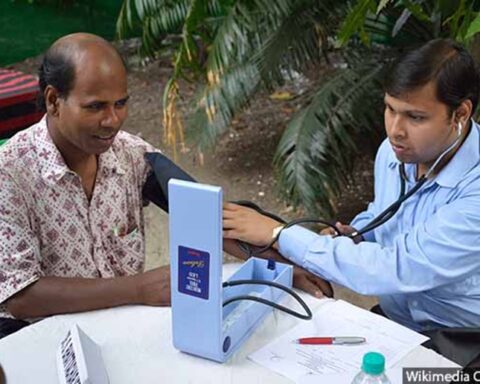LONDON, Nov. 30 (UPI) – People diagnosed with coronary heart disease in early middle age are at much higher risk of developing dementia in later life than people with healthy hearts, according to a Chinese study of more than 400,000 Britons published Wednesday.
Men and women who develop heart disease early, particularly those under 45, have a 36% increased risk of developing dementia, a 13% increased risk of Alzheimer’s and are 78% more likely to develop vascular dementia — brain impairment caused by oxygen and nutrient deprivation, according to the research published in Journal of the American Heart Association.
By analyzing the health data of 432,667 National Health Service patients from the U.K. Biobank, researchers found the risk of dementia rose in direct proportion to the younger the age of coronary heart disease onset, per 10-year decrease in age.
Coronary heart disease onset data and subsequent incident dementia collected over a follow-up period averaging 13 years showed 5,876 cases of dementia, 2,540 cases of Alzheimer’s disease and 1,220 cases of vascular dementia.
Earlier coronary heart disease onset, in general, was associated with a 25% increased risk of dementia, a 29% increased risk of Alzheimer’s disease and a 22% increased risk of vascular dementia, compared with subjects with healthy hearts.
Existing research has established an association between coronary heart disease and dementia in older adults, but the Chinese research is believed to be the first large-scale study to attempt to prove a link between the age at which people develop coronary heart disease and their risk of getting dementia in later life.
The research team had previously documented accelerated cognitive decline in adults following a new diagnosis of coronary heart disease, doctoral student Fanfan Zheng, senior study author and researcher in the School of Nursing at the Chinese Academy of Medical Sciences and Peking Union Medical College in Beijing, said in a news release.
“What surprised us most was the linear relationship between age of coronary heart disease onset and dementia. This shows the huge detrimental influence of premature coronary heart disease on brain health,” Zheng said.
“As more people live longer and are diagnosed with coronary heart disease at a younger age, it’s likely there will be a large increase in the number of people living with dementia in years to come. Healthcare professionals should be aware of individuals diagnosed with coronary heart disease at a young age.”
The next step, Zheng said, was to figure out whether modifying an individual’s cardiovascular risk early in life would lead to “better brain health” later.
Although the results adjust for demographic and lifestyle factors, the authors warn of limitations, including that the findings’ utility across a broad range of races and ethnicities is capped by the fact that 94% of the U.K. Biobank study cohort used were White and that as an observational study, the findings are not proof of cause and effect.
Coronary heart disease caused 382,820 deaths in 2020, according to the American Heart Association’s 2023 Statistical Update. The estimated rate of dementia among American adults 65 and older was 10.5% in 2012, with a rate of 7.3% in men and 12.9% in women, according to the Aging, Demographics and Memory Study, part of the long-running Health and Retirement Study in the United States.
The Chinese study was funded by grants from the National Natural Science Foundation of China, the Non‐Profit Central Research Institute Fund of the Chinese Academy of Medical Sciences and the 2022 China Medical Board Open Competition.





